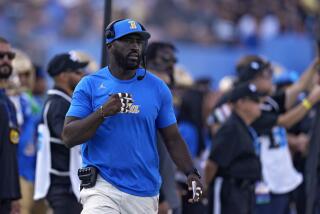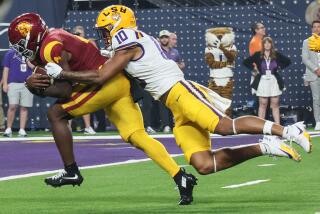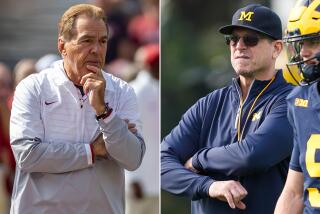Virginia Says No to ABC, Won’t Switch : College football: The university refuses to change the starting time of a Parents’ Day game to get it on network television. It might be a first.
Getting colleges to change game times for television is a common occurrence.
This week, UCLA switched the start of its home game with Arizona State from 12:30 to 7 p.m. to accommodate Prime Ticket. And USC switched the start of Saturday’s home game with Washington State from 1:30 to 12:30 p.m. for ABC.
Fans don’t like it, but the schools agree to change because of the money and exposure television offers. Mostly, it’s the money.
So it’s more than a little surprising that Virginia told ABC that it will not change the time of its Oct. 31 game against Florida State.
ABC asked Virginia to switch from 7:30 p.m., EST, to 3:30, but university officials, citing conflicts with their annual Parents Weekend festivities, said no.
That may be a first. David Downs, ABC Sports’ vice president of programming, who has been at the network for 12 years, said he has never heard of such a thing.
ABC planned to show Florida State-Virginia on a regional basis, so it will cost each school about $200,000.
ABC spokesman Mark Mandel said the network will televise Georgia-Florida at Jacksonville, Fla., instead.
So Florida State not only lost an ABC payday, its place was taken by a rival school.
“I’m very disappointed, and that is putting it mildly,” Florida State Athletic Director Bob Goin said.
But not all is lost for Florida State. The plan is to show Virginia-Florida State on pay-per-view. The cost: $19.95.
It will be Florida State’s third pay-per-view telecast of the season. Games against Duke and Wake Forest were the other two. The carrier is the Florida-based Sunshine Network.
Florida State is a new member of the Atlantic Coast Conference, of which Virginia has been a longtime member.
The ACC has no rules governing switching games for television, leaving it up to the schools.
“We encourage the schools to be flexible,” ACC spokesman Brian Morrison told the Associated Press. “If you look at the league’s television contracts for basketball, we got those contracts by being flexible. But football is a little different because there are only six or seven home games.”
Morrison said the conference often serves as a “go-between” for television networks and schools, but no such negotiations occurred this time.
“I think this type of situation will be discussed, but no guidelines will be added or changed,” he said. “This whole situation will be beneficial to the league to help us understand when it comes up again.”
Kim Record, Virginia’s associate athletic director of administration, defended the school’s decision. She said school officials told ABC three or four weeks ago the game could not be moved.
“In a way we were caught between a rock and a hard place, but we made a commitment we had to honor,” she said. “We could not do it without creating more chaos internally in terms of things that needed to be changed.”
UCLA Athletic Director Peter Dalis can empathize.
“We’ve been getting calls this week from fans upset about our time change,” he said. “It’s a problem, no question. But there’s not much we can do about it.
“People tell me we shouldn’t change game times, but my response is, ‘What do you want us to do, get out of big-time football?’ I’m being facetious, but that’s essentially what it boils down to.”
Dalis and other UCLA officials didn’t learn until Saturday, after the Bruins lost to Washington State and USC beat California, that their game against Arizona State would not be televised by ABC.
“Before the season, and before all our injuries, I sure would have bet that our game with Arizona State would have been on ABC. That’s why we scheduled it for 12:30.”
Dalis said that UCLA’s contract with Prime Ticket requires that it provide two or three live telecasts per season.
According to Duane Lindberg, assistant Pacific 10 commissioner in charge of electronic communications, a Prime Ticket telecast is worth about $115,000 to each school.
The conference’s contract with ABC provides that each participating team gets about $160,000, Lindberg said, with other schools in the conference also getting a share.
“Determining exactly what each school gets isn’t easy,” Lindberg said. “It’s a complicated formula. So those are just estimates.”
This week’s time change is UCLA’s first for a home game this season.
USC’s game at Oklahoma was changed for television, as was last Saturday’s home game with California.
The Trojans’ Oct. 31 game at Arizona State also has been switched from a night game to 3:30 p.m., PST, to accommodate Prime Ticket.
More to Read
Go beyond the scoreboard
Get the latest on L.A.'s teams in the daily Sports Report newsletter.
You may occasionally receive promotional content from the Los Angeles Times.






